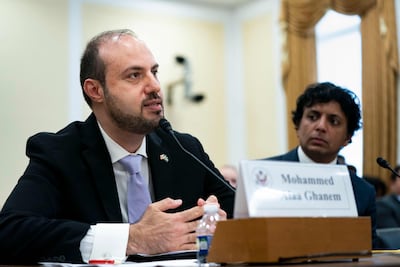Acclaimed filmmaker M Night Shyamalan is known for his ability to craft stories – and on the sidelines of this week's pivotal Nato summit, he came to Washington in a bid to convince Congress to pay more attention to Syria.
“It is a fascinating discrepancy, the energy around Ukraine versus the energy around Syria, when they're almost identical situations with identical perpetrators,” Shyamalan said on Capitol Hill.
Speaking alongside his wife Bhavna Shyamalan, a psychologist and cofounder of the M Night Shyamalan Foundation, the couple spoke to The National after a hearing with the congressional Helsinki Commission on Russia's mirrored influences in both Syria and Ukraine.
Shyamalan testified alongside Syrian Emergency Task Force executive director Mouaz Moustafa and the Syrian-American civil society leader Mohammed Alaa Ghanem.

The Shyamalan Foundation supports Mr Moustafa and his work with SETF, and the Shyamalans have also brought their children into north-west Syria for visits alongside the Washington-based organisation.
World leaders have descended on the US capital city this week, rallying Nato support for Ukraine's defence against the Russian invasion.
For the Shyamalans and the Syrian advocates they joined in Congress on Wednesday, the Syrian plight, and Moscow's defining role in it, must also be addressed.
“The prejudice that we feel in the United States about countries that are not white versus countries that are white, and oh my gosh, the white ones are 'us' and the brown ones are 'oh, they're troubled over there,'” Mr Shyamalan said.
“That's deep in our genetics of how we react. But those things hopefully will change, and that's partly why we were here, to say it's the same. It's the same.”
Russia has played a decisive role in the Syrian conflict since 2015, providing air power to Syrian and Iranian-backed ground forces that has propped up President Bashar Al Assad’s territorial control and solidified the regime’s hold on power.
Mr Ghanem told the committee: “Russia got away with it all. A lesson that [Russian President Vladimir] Putin noted and replicated again in Ukraine.”
The hearing unfolded at the same time that Ukrainian President Volodymyr Zelenskyy worked his way through Capitol Hill in a bid to solidify congressional support – after US President Joe Biden announced a “historic donation” of long-range air defence systems to Kyiv.
Mr Moustafa added that “it's incredibly important that this hearing is happening on the sidelines of the Nato summit”.
“Because Ukraine wouldn't be where it is today if we had done something about Russia and Syria, and we can still do something about Russia in Syria and Ukraine,” he told The National.
Ms Shyamalan said that her husband was trying to portray to congressional leaders “the very human side” of the continuing conflict in Syria, and the hearing largely touched on the refugee crisis the conflict has created.
According to a 2023 UN report, the war in Syria has killed 230,224 civilians, including 15,272 who died due to torture, in addition to the arbitrary arrest/enforced disappearance of 154,817 others.
An estimated 14 million citizens have been displaced, and Mr Ghanaam argued that Russia is deeply implicated, with Europe grappling with the effects today.
“Russia dropped tens of thousands of tonnes of munitions on residential areas in Syria … Now, after they left, Putin realises that there is a great potential for using these massive refugee flows, to destabilise domestic European politics, especially with fuelling the rise of the far right,” he said.
Ms Shyamalan emphasised: “There's no bigger human rights issue right now, other than all of the killing that's happening in Syria from Assad.
“It's hard to know if there's going to be movement forward, but it was really hopeful to see both sides come together in this bipartisan way.”

